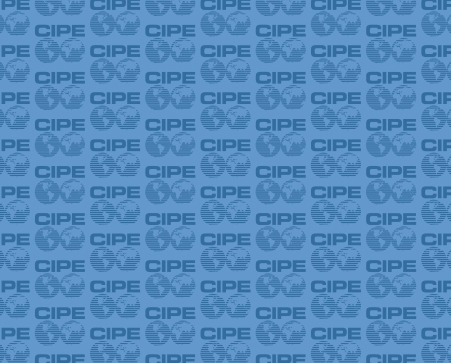
Photo courtesy of the G4G facebook page.
The 2008 Rose Revolution, which marked Georgia’s turn down a more democratic, market-based and Western-oriented path, kicked off a process of robust reforms and aggressive moves headed by then-President Mikheil Saakashvili to tackle the endemic corruption that had long hampered the country’s economic development. The turn was affirmed in 2014 when Georgia signed the Deep and Comprehensive Free Trade Agreement (DCFTA) and Association Agreement with the European Union (EU), signaling a commitment to enact further reforms and open its markets to Europe – a step that Georgians envision as eventually leading to EU membership.
However, despite the strong anti-corruption measures enacted after 2008, concerns about the rule of law and quality of governance also arose during that period. While there was not necessarily a threat of reforms being derailed, there were legitimate questions as to how representative the process was under the then-ruling government. Those trends led (in part) to the defeat of Saakashvili’s party in parliamentary elections in 2012, followed by the defeat of the presidential candidate from his party the following year. The business community had generally been in favor of many of the changes enacted under Saakashvili—though small and medium-sized enterprises (SMEs) did not always have a seat at the table.. With the change in government came some concerns that the economic reform trajectory could be reversed.
Partly to address these concerns, and to ensure continued and long-term economic growth, USAID launched a five-year, $19.3 million project called Governing for Growth (G4G) in Georgia in 2014, which was “designed to enhance governance in… tax and customs administration, trade facilitation, land registration, electricity trading policy, and water resource management.” Implemented by Deloitte Consulting, G4G aimed to “build a culture of collaborative consultation, where policies and laws have the benefit of constructive public input” – all key elements of CIPE’s approach to economic reform whenworking with partners worldwide. To help achieve those goals, CIPE was brought on board by Deloitte as a key subcontractor under G4G.
One of CIPE’s main responsibilities within the G4G project has been to strengthen the voice of business – with an emphasis on SMEs – by building a broad-based network of representative business associations and policy-oriented think tanks that could work collaboratively and advocate for pro-business reforms from a grassroots perspective. CIPE hired a local business association specialist, Maya Eristavi, who became the advocacy and capacity building component lead within the G4G team. With support from CIPE Eurasia program staff and experts, Eristavi recruited associations, chambers of commerce, and think tanks to join the Economic Policy Advocacy Coalition (EPAC), formally launched in September 2015.
A year later, in September 2016, I traveled to Tbilisi to attend a celebration marking the first anniversary of the creation of EPAC. In just one short year, Eristavi guided the growth of EPAC into a network of nearly 60 private-sector organizations. Some of the highest profile organizations in Georgia are part of the network, such as the American Chamber of Commerce, the Business and Economic Center, Georgian Lawyers for Independent Profession, the Georgian Small and Medium Enterprise Association, the Taxpayers Union, the Infrastructure Construction Companies Association and PMC Consulting. EPAC also includes associations representing the wine industry, the tourism industry, the legal industry, the microfinance sector, and women entrepreneurs, among others.
The anniversary celebration, was marked by speeches by U.S. Ambassador Ian C. Kelly, U.K. Ambassador Justin McKenzie Smith, and government officials including the first deputy minister of finance and the deputy minister of economy and sustainable development. A range of EPAC members representing foreign investors and think tanks spoke, and new EPAC members were recognized with certificates. I made brief remarks on how CIPE’s work with G4G to help build EPAC fits with the CIPE coalition-based approach to policy advocacy, and noted that EPAC is the first such coalition of its kind ever created in Georgia. In all, over 100 representatives of the government, the diplomatic corps, civil society, and the private sector attended the event.
In its first year, EPAC has already had a number of important reform achievements to support G4G’s work. For example, on land registration reform, the government accepted an EPAC proposal to implement systemic land registration and titling in rural areas. EPAC working groups have also looked at state procurement systems, and advocacy efforts have led to a change in State Procurement Article 55, refining rules for overhead expenses and planned profits during the procurement of construction services by the government.
In addition to its work with EPAC, CIPE has also supported a G4G effort to establish, with the Ministry of Economy, a platform for private-public dialogue on trade issues, the Trade Advisory Group (TAG), to contribute to expanding Georgia’s trade relations and to implement the requirements of the DCFTA. In the coming months, CIPE will assist G4G in training economic journalists to improve their reporting on, and analysis of, economic decisions facing the country. In the coming year, as Eristavi continues her work to build EPAC and expand its advocacy reach, CIPE will be supporting G4G’s efforts to make the coalition sustainable and build lasting governance mechanisms in the coalition, in line with similar CIPE efforts in other countries. In this way, EPAC will be poised to be a force for SME-oriented reforms in Georgia for the long run.
Marc Schleifer is Regional Director for Europe, Eurasia, and South Asia at CIPE.
Published Date: November 02, 2016